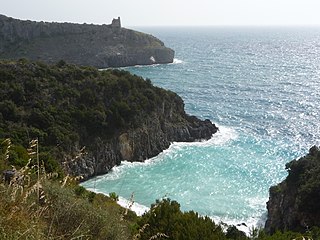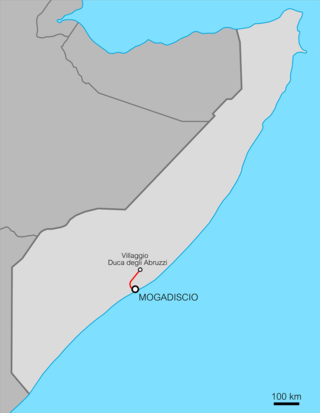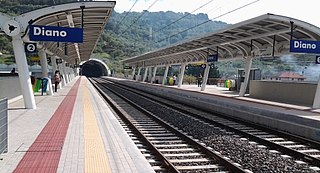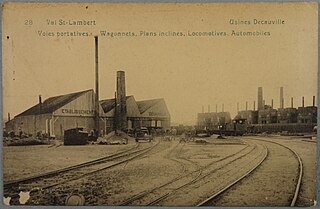
The Decauville factory in Diano Marina produced prefabricated narrow gauge railway track and rolling stock from 1889 to 1895 in Diano Marina, Italy.

The Decauville factory in Diano Marina produced prefabricated narrow gauge railway track and rolling stock from 1889 to 1895 in Diano Marina, Italy.
The Etablissements Decauville ainé, a French manufacturer of railway material, bought 4 hectares of land in Diano Marina of the Italian Riviera about 90 kilometres (56 mi) southwest of Genoa, to build a new production facility for railway material. The factory was established on the site of a former cement factory between the Nice-Genoa railway line and the sea. The main objective, was to minimise the cost for tolls and taxes, when customs levied 120 FF per tonne of imported portable track. [1] p. 18 The company was set-up the factory on 13 November 1889. It reserved itself the right to acquire the establishment either on his own account or on behalf of another person or company designated by the company. [2]
The factory specialised in the manufacture of portable railway track, portable bridges and various other devices are also manufactured there. This workshop employed 50 workers and the motive power was provided by a 20 hp locomobile. [3]
The Diano-Marina plant was decommissioned (valued at 110,000 Francs) in 1895, when the Decauville factory in Val-Saint-Lambert in Belgium was set-up on 1 January 1895. [1] p. 54 Most ohe machines of the Italian factory were exported to Russia, to be used in a Franco-Russian joint venture for building narrow gauge equipment, while the manager of the Italian factory, Mr Ferrari, took over a position as director in Val-Saint-Lambert. [1] p. 88-89

Decauville was a manufacturing company which was founded by Paul Decauville (1846–1922), a French pioneer in industrial railways. Decauville's major innovation was the use of ready-made sections of light, narrow gauge track fastened to steel sleepers; this track was portable and could be disassembled and transported very easily.

Diano Marina is a comune (municipality) in the Province of Imperia in the Italian region of Liguria, located about 90 kilometres (56 mi) southwest of Genoa and about 5 kilometres (3.1 mi) northeast of Imperia.

Cilento is an Italian geographical region of Campania in the central and southern part of the province of Salerno and an important tourist area of southern Italy.

Railway transport in Somalia consisted of the erstwhile Mogadishu–Villabruzzi Railway and secondary tracks. The system was built during the 1910s by the authorities in Italian Somaliland. Its track gauge was 950 mm, a gauge favoured by the Italians in their colonies in the Horn of Africa and North Africa. The railway was dismantled in the 1940s by the British during their military occupation of Italian Somaliland, and was subsequently never rehabilitated.

The Genoa–Pisa railway is one of the trunk lines of the Italian railway network. It runs along the Ligurian coast from Genoa to Pisa through the Riviera di Levante and the Versilia. It passes through the cities of Massa, Carrara and La Spezia. South of Pisa the Pisa–Rome line continues along the Tyrrhenian coast to Rome. The line is double track and is fully electrified at 3,000 V DC. Passenger traffic is managed by Trenitalia.

Most narrow-gauge railways in Italy were built with Italian metre gauge, which is actually 950 mm because historically the Italian track gauge was defined from the centres of the rail instead of the internationally accepted method of measuring the gauge from the inside edges of the rails. Several metre-gauge lines were built in northern Italy.

The Alessandria–Novara–Arona railway is a railway line in Italy that connects Alessandria to Arona on Lake Maggiore, passing through Novara.

The Salerno–Reggio Calabria railway is the most important north–south railway connection between Sicily, Calabria and the rest of the Italian peninsula. It forms the southern section of Corridor 1 of the European Union's Trans-European high-speed rail network, which connects Berlin and Palermo. Its southern part, between Rosarno and San Lucido is also used as an RFI freight route between the Port of Gioia Tauro and the Adriatic railway.

Diano railway station is a railway station serving the town of Diano Castello, in Liguria, northwestern Italy. The station is located on the Genoa–Ventimiglia railway and was opened on 11 December 2016. The train services are operated by Trenitalia.

The Diego Suarez Decauville railway was a 24 km (15 mi) long 600 mm gauge military railway from Antsirane to Sakaramy in Madagascar.

The Naphtha Hill Decauville Railway was a 32.5 km (20.2 mi) long horse-drawn railway with a gauge of 500 mm, which was supplied by the French company Decauville. It operated around 1885-1889 near Bala-Ischem, 12 km (7.5 mi) southeast of Balkanabat in Turkestan. Its track and rolling stock were originally used during the construction of the Transcaspian Railway to transport the rails and sleepers to the construction site using two oil-fired Decauville steam locomotives with works numbers N° 9 and N° 10. It was built with portable track, i.e. 5 m long rail panels prefabricated in France with a track gauge of 500 mm.

The Decauville Railway of the Bancalari Mill was a 5.4 km (3.4 mi) long narrow-gauge railway with a gauge of 600 mm, which was laid around 1889 in Manzanares, a town belonging to Pilar Partido in the Buenos Aires Province of Argentina.

The Decauville Tramway at Exposition Universelle in Gent, 1913 was a temporary narrow gauge railroad with a gauge of 600 mm, which was operated during the World Fair held in Ghent from 26 April to 3 November 1913.

The Chemin de fer du Val de Passey is a 0.8 km (0.5 mi) long heritage railway with 600 mm gauge near Choloy-Ménillot southwest of Toul in France.

The Decauville factory in Moulins was used from 1918 to 1959 by the French railway supplier Decauville at Moulins, Allier.

The Decauville factory in Val-Saint-Lambert was a Belgian subsidiary of the French narrow-gauge railway manufacturer Decauville. It was founded in 1895 and taken over by the Berlin-based company O&K from 1911.

The Decauville factory in Aulnay-sous-Bois produced prefabricated narrow gauge railway track and rolling stock from 1914 to the 1950ies in Aulnay-sous-Bois, France.
The Decauville factory in Petite-Synthe produced prefabricated narrow gauge railway track and rolling stock from 1903 to 1922 in Petite-Synthe near Dunkirk, France.

The Decauville railway of Suberbieville was a Decauville narrow-gauge railway near Maevatanana in Madagascar. It initially had a track gauge of 600 mm and after the arrival of six steam locomotives in 1896, it was metre gauge.